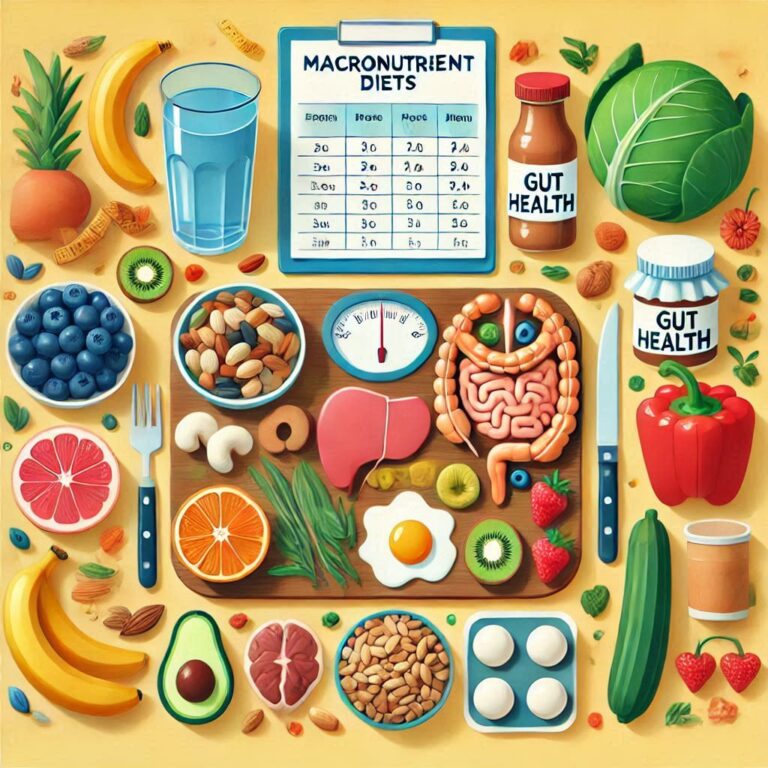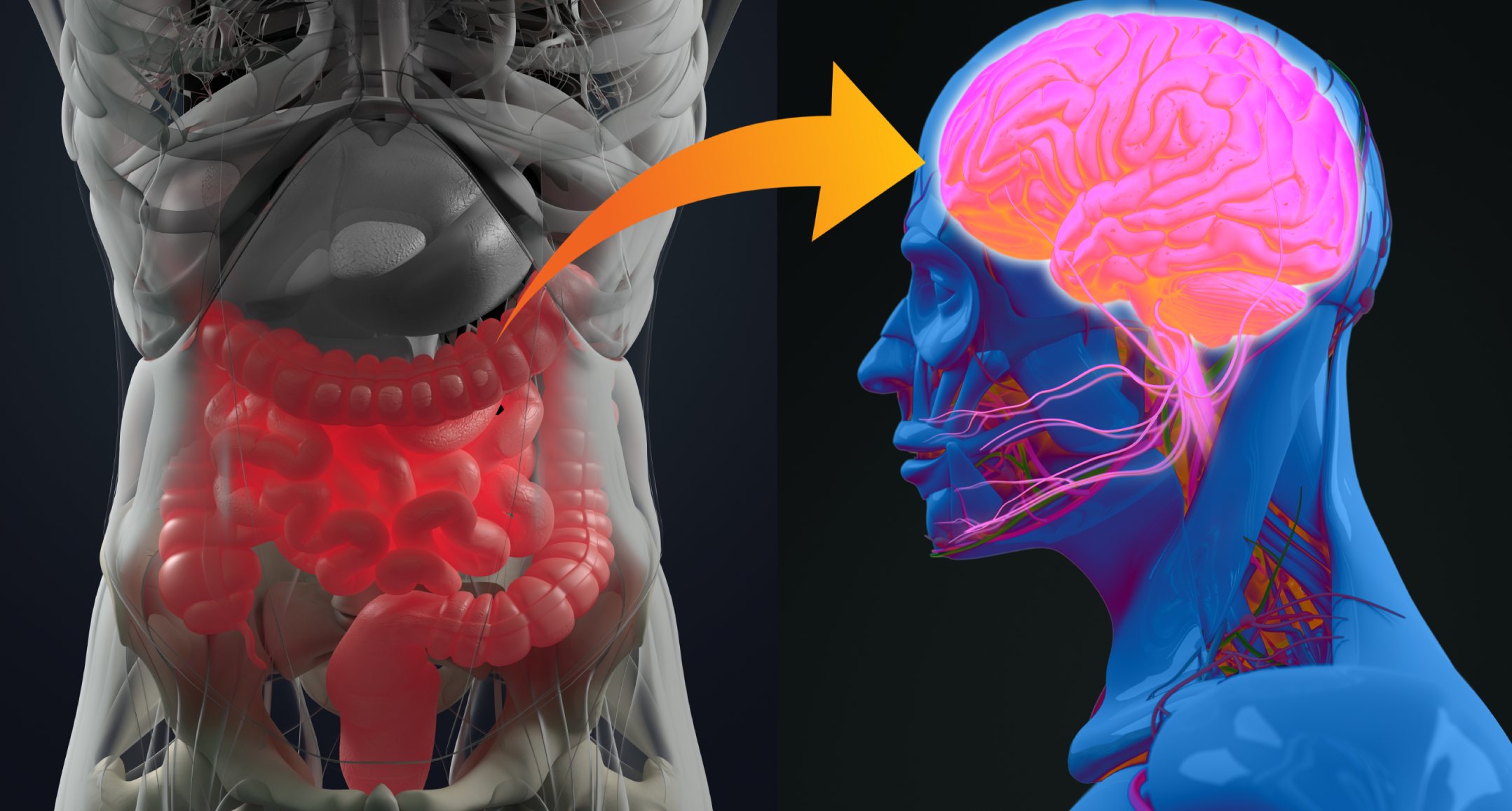Macronutrient balance is a cornerstone of good health, influencing everything from energy levels and digestion to disease prevention and overall well-being. Carbohydrates, proteins, and fats each play distinct yet interconnected roles in maintaining bodily functions, and their balance can directly impact gut health, metabolic efficiency, and long-term wellness. Understanding how these macronutrients contribute to health and integrating diverse dietary approaches and meal plans can help individuals achieve optimal health while preventing nutritional imbalances.
I. Carbohydrates and Gut Health: Achieving Macronutrient Balance.
Carbohydrates play a pivotal role in nurturing a healthy gut microbiome, which is essential for overall well-being. Understanding the types of carbohydrates and their specific impacts on gut health can guide dietary choices that promote a balanced and thriving microbial community.
-Types of Carbohydrates and Their Impact on the Gut Microbiome:
Dietary Fiber: Found in plant-based foods, dietary fiber is a form of carbohydrate that the human body cannot digest. Instead, it serves as a primary energy source for beneficial gut bacteria. These bacteria ferment fiber, producing short-chain fatty acids (SCFAs) like butyrate, acetate, and propionate, which support intestinal health and reduce inflammation.
Resistant Starch: Present in foods such as unripe bananas, cooked and cooled potatoes, and legumes, resistant starch escapes digestion in the small intestine and reaches the colon intact. Here, it acts similarly to dietary fiber, promoting the growth of beneficial bacteria and enhancing SCFA production.
Prebiotics: Specific types of fiber, like inulin and fructooligosaccharides (FOS), are classified as prebiotics. They selectively stimulate the growth of beneficial bacteria, such as Bifidobacteria and Lactobacilli, contributing to a balanced gut microbiome.
-Mechanisms by Which Carbohydrates Promote Gut Health:
Fermentation and SCFA Production: Beneficial bacteria ferment non-digestible carbohydrates, leading to the production of SCFAs. These acids lower the pH of the colon, inhibiting the growth of pathogenic bacteria and supporting the integrity of the gut lining.
Enhancement of Gut Barrier Function: SCFAs, particularly butyrate, serves as an energy source for colonocytes (cells lining the colon), strengthening the gut barrier and preventing the translocation of harmful pathogens into the bloodstream.
Modulation of Immune Responses: A diet rich in complex carbohydrates fosters a diverse microbial community that can modulate immune responses, reducing the risk of inflammatory diseases.
-Dietary Recommendations for Supporting a Healthy Gut Microbiome:
Incorporate a Variety of Fiber-Rich Foods: Include fruits, vegetables, whole grains, legumes, nuts, and seeds in your diet to provide diverse substrates for gut bacteria.
Choose Whole Grains Over Refined Grains: Whole grains contain more fiber and nutrients, supporting a healthier gut microbiome compared to refined grains.
Include Resistant Starch Sources: Consume foods like cooked and cooled potatoes, green bananas, and legumes to increase resistant starch intake.
Limit Intake of Simple Sugars and Processed Foods: High consumption of simple sugars and processed foods can negatively impact gut microbiota composition, promoting the growth of harmful bacteria.
By focusing on a diet rich in complex carbohydrates and fiber, individuals can foster a diverse and balanced gut microbiome, leading to improved digestive health and reduced risk of chronic diseases.
II. Lipids and Gut Health: Achieving Macronutrient Balance.
Lipids, commonly known as fats, are essential macronutrients that play a significant role in maintaining a healthy gut microbiome. The type and amount of dietary fats consumed can influence the composition and function of gut bacteria, thereby impacting overall health.
-Types of Dietary Fats and Their Impact on the Gut Microbiome:
Saturated Fats: Found in animal products like red meat and full-fat dairy, a high intake of saturated fats has been linked to an increase in pro-inflammatory gut bacteria. This shift can lead to gut dysbiosis, a microbial imbalance associated with various health issues.
Monounsaturated Fats: Present in foods such as olive oil, avocados, and certain nuts, monounsaturated fats are associated with the growth of beneficial gut bacteria. These fats support microbial diversity and have anti-inflammatory properties, promoting gut health.
Polyunsaturated Fats (PUFAs): Including omega-3 and omega-6 fatty acids, PUFAs are found in fatty fish, flaxseeds, and walnuts. Omega-3 fatty acids, in particular, have been shown to enhance the abundance of beneficial gut bacteria and reduce inflammation. However, an imbalance favoring omega-6 over omega-3 can promote inflammation, highlighting the importance of a balanced intake.
-Mechanisms by Which Lipids Influence Gut Health:
Modulation of Gut Microbial Composition: Dietary fats can alter the gut environment, influencing which bacterial species thrive. Healthy fats like monounsaturated and omega-3 fatty acids promote beneficial bacteria, while excessive saturated fats may encourage harmful species.
Production of Bioactive Compounds: Beneficial gut bacteria metabolize certain fats to produce short-chain fatty acids (SCFAs), which support the integrity of the gut lining and have anti-inflammatory effects.
Interaction with Bile Acids: Dietary fats stimulate bile acid production, which can be modified by gut bacteria into secondary bile acids. These compounds influence gut motility and microbial composition, affecting overall gut health.
-Dietary Recommendations for Supporting a Healthy Gut Microbiome:
Prioritize Healthy Fats: Incorporate sources of monounsaturated and omega-3 fatty acids into your diet, such as olive oil, avocados, fatty fish, and nuts.
Limit Saturated Fat Intake: Reduce consumption of foods high in saturated fats, including red meat and full-fat dairy products, to prevent promoting pro-inflammatory gut bacteria.
Maintain a Balanced Fat Intake: Ensure a proper balance between omega-3 and omega-6 fatty acids to support anti-inflammatory processes and a healthy gut microbiome.
By making informed dietary choices that emphasize healthy fats and balance overall macronutrient intake, individuals can foster a gut environment conducive to beneficial bacteria, thereby enhancing digestive health and reducing the risk of chronic diseases.
III. Proteins and Gut Health: Achieving Macronutrient Balance.
Proteins are fundamental macronutrients that play a crucial role in maintaining a healthy gut microbiome. The type and amount of dietary protein consumed can significantly influence the composition and function of gut bacteria, thereby impacting overall health.
-Types of Dietary Proteins and Their Impact on the Gut Microbiome:
Animal-Based Proteins: Sources include meat, poultry, fish, eggs, and dairy products. High intake of animal proteins, especially red and processed meats, has been associated with an increase in gut bacteria that produce potentially harmful metabolites, such as trimethylamine N-oxide (TMAO), which is linked to cardiovascular diseases.
Plant-Based Proteins: Found in legumes, nuts, seeds, and whole grains, plant proteins are rich in fiber and bioactive compounds. These components promote the growth of beneficial gut bacteria, enhance microbial diversity, and lead to the production of short-chain fatty acids (SCFAs) that support gut health.
-Mechanisms by Which Proteins Influence Gut Health:
Fermentation and Metabolite Production: Gut bacteria ferment undigested proteins, producing metabolites that can be either beneficial or harmful. For instance, fermentation of plant proteins often results in SCFAs, which have anti-inflammatory properties, while excessive animal protein fermentation can lead to the production of ammonia and other potentially toxic compounds.
Modulation of Gut Microbial Composition: The source of dietary protein influences the gut environment, affecting which bacterial species thrive. Plant-based proteins tend to promote beneficial bacteria like Bifidobacteria and Lactobacilli, whereas high animal protein diets may favor the growth of bacteria associated with inflammation.
Impact on Gut Barrier Function: Proteins contribute to maintaining the gut barrier by providing essential amino acids necessary for the repair and regeneration of intestinal cells. A healthy gut barrier prevents the translocation of harmful pathogens and toxins into the bloodstream.
-Dietary Recommendations for Supporting a Healthy Gut Microbiome:
Diversify Protein Sources: Incorporate a variety of protein sources into your diet, emphasizing plant-based options such as beans, lentils, nuts, and seeds, while moderating the intake of red and processed meats.
Combine Proteins with Fiber-Rich Foods: Pairing proteins with high-fiber foods can enhance the production of beneficial metabolites and support the growth of healthy gut bacteria.
Monitor Protein Intake Levels: While protein is essential, excessive consumption, particularly from animal sources, can negatively impact gut health. Aim for a balanced protein intake that meets but does not significantly exceed daily requirements.
By making informed dietary choices that emphasize a balance of macronutrients and a variety of protein sources, individuals can foster a gut environment conducive to beneficial bacteria, enhancing digestive health and reducing the risk of chronic diseases.
IV. The Key to Optimal Health: Achieving Balance Among Macronutrients.
Achieving a balanced intake of macronutrients carbohydrates, proteins, and fats is essential for maintaining optimal health and preventing various health disorders. Each macronutrient plays a unique role in bodily functions, and their appropriate balance can significantly influence overall well-being.
-Carbohydrates: Carbohydrates are the main source of energy for the body, fueling daily activities and supporting brain function. Consuming complex carbohydrates, such as whole grains, fruits, and vegetables, provides sustained energy and essential nutrients. In contrast, excessive intake of simple sugars and refined carbs can lead to weight gain and increase the risk of type 2 diabetes.
-Proteins: Proteins are vital for building and repairing tissues, producing enzymes and hormones, and supporting immune function. Incorporating various protein sources, including lean meats, dairy, legumes, and nuts, ensures the intake of essential amino acids. Balancing protein intake is crucial, as both deficiency and excess can lead to health issues such as muscle wasting or kidney strain.
-Fats: Fats are necessary for hormone production, nutrient absorption, and providing energy. Emphasizing healthy fats, such as monounsaturated and polyunsaturated fats found in olive oil, avocados, and fatty fish, supports cardiovascular health. Limiting saturated and trans fats is important to reduce the risk of heart disease.
-The Importance of Macronutrient Balance: An appropriate balance of macronutrients helps maintain a healthy weight, supports metabolic functions, and reduces the risk of chronic diseases. For instance, a diet overly rich in fats and low in carbohydrates can lead to nutrient deficiencies and increased cholesterol levels. Conversely, excessive carbohydrate intake with insufficient protein and fat can cause blood sugar spikes and energy crashes.
-Personalized Macronutrient Ratios: Individual macronutrient needs vary based on factors such as age, gender, activity level, and health goals. Consulting with healthcare professionals or registered dietitians can help determine the optimal macronutrient distribution tailored to individual needs, promoting overall health and preventing diet-related disorders.
In summary, maintaining a balanced intake of carbohydrates, proteins, and fats is fundamental to preventing health disorders and promoting overall well-being. Making informed dietary choices and seeking professional guidance can help achieve this balance effectively.
V. How do Different Diets Ensure Macronutrient Balance for Optimal Health?
Balancing macronutrients carbohydrates, proteins, and fats is crucial for maintaining energy, supporting bodily functions, and preventing health issues. Different dietary approaches provide unique ways to achieve this balance, catering to diverse lifestyles, preferences, and health goals. Below, we explore how popular diets manage macronutrient distribution and contribute to overall well-being.
-The Mediterranean Diet:
Emphasizing whole foods, the Mediterranean diet includes:
Carbohydrates: Primarily from whole grains, fruits, and vegetables, providing fiber and essential nutrients.
Proteins: Sourced from fish, legumes, and moderate amounts of poultry and dairy.
Fats: Mainly from olive oil and nuts, rich in monounsaturated fats.
This diet supports cardiovascular health and has been linked to reduce the risks of chronic diseases.
-The DASH Diet :(Dietary Approaches to Stop Hypertension)
Designed to combat high blood pressure, the DASH diet focuses on:
Carbohydrates: Abundant in fruits, vegetables, and whole grains.
Proteins: Lean sources like poultry, fish, and legumes.
Fats: Low intake, emphasizing healthy fats from nuts and seeds.
This approach promotes heart health and aids in weight management.
-The Ketogenic Diet
A low-carbohydrate, high-fat diet that includes:
Carbohydrates: Limited to 5–10% of daily intake, focusing on non-starchy vegetables.
Proteins: Moderate amounts from meat, fish, and eggs.
Fats: High intake from sources like avocados, oils, and nuts.
This diet shifts the body into ketosis, utilizing fat for energy, and is often used for weight loss and managing certain medical conditions.
-Plant-Based Diets:
Focusing on foods derived from plants, these diets offer:
Carbohydrates: From fruits, vegetables, grains, and legumes.
Proteins: Primarily from legumes, nuts, seeds, and soy products.
Fats: Sourced from avocados, nuts, seeds, and plant oils.
Plant-based diets are associated with lower risks of heart disease and certain cancers.
-Balanced Diet Approach:
A general guideline for macronutrient distribution is:
Carbohydrates: 45–65% of daily calories.
Proteins: 10–35% of daily calories.
Fats: 20–35% of daily calories.
This flexible approach allows for personalization based on individual health goals and preferences.
Selecting a dietary pattern that ensures a balanced intake of macronutrients is vital for health. Consulting with healthcare professionals can help tailor these approaches to individual needs, promoting overall well-being.
VI. Creating Balanced Menus: Ensuring Optimal Macronutrient Intake.
Maintaining a healthy diet goes beyond counting calories it’s about achieving the right balance of macronutrients: carbohydrates, proteins, and fats. Each meal should include a thoughtful combination of these nutrients to fuel the body, support vital functions, and prevent nutritional imbalances. Below are practical and delicious menu ideas for breakfast, lunch, dinner, and snacks that exemplify how to achieve this balance effortlessly.
-Breakfast: Greek Yogurt Parfait.
Ingredients:
1 cup of plain Greek yogurt
½ cup of mixed berries (e.g., strawberries, blueberries, raspberries)
2 tablespoons of granola
1 tablespoon of chia seeds
Drizzle of honey (optional)
Macronutrient Breakdown:
Carbohydrates: Berries and granola provide complex carbs and fiber.
Proteins: Greek yogurt offers a high protein content.
Fats: Chia seeds contribute healthy omega-3 fatty acids.
Health Benefits:
This parfait delivers a balanced mix of macronutrients, supporting sustained energy release and satiety throughout the morning. The fiber from berries and chia seeds aids digestion, while the protein in Greek yogurt supports muscle maintenance.
-Lunch: Quinoa and Chickpea Salad.
Ingredients:
1 cup of cooked quinoa
½ cup of canned chickpeas, rinsed and drained
1 cup of mixed vegetables (e.g., cherry tomatoes, cucumber, bell peppers)
2 tablespoons of crumbled feta cheese
1 tablespoon of olive oil
Juice of half a lemon
Salt and pepper to taste
Macronutrient Breakdown:
Carbohydrates: Quinoa and vegetables provide complex carbs and fiber.
Proteins: Chickpeas and feta cheese offer plant-based and dairy proteins.
Fats: Olive oil supplies healthy monounsaturated fats.
Health Benefits:
This salad is rich in fiber and plant-based proteins, promoting digestive health and prolonged satiety. The inclusion of olive oil adds heart-healthy fats and the variety of vegetables ensures a range of vitamins and minerals.
-Dinner: Baked Salmon with Sweet Potato and Steamed Broccoli.
Ingredients:
6 oz salmon fillet
1 medium sweet potato
1 cup of broccoli florets
1 teaspoon of olive oil
Salt, pepper, and herbs (e.g., dill or parsley) for seasoning
Macronutrient Breakdown:
Carbohydrates: Sweet potato provides complex carbs and fiber.
Proteins: Salmon is a rich source of high-quality protein.
Fats: Salmon offers omega-3 fatty acids; olive oil adds monounsaturated fats.
Health Benefits:
This meal delivers a balanced mix of macronutrients, with omega-3 fatty acids from salmon supporting heart health and anti-inflammatory processes. Sweet potatoes offer fiber and essential vitamins, while broccoli provides antioxidants and fiber, contributing to overall health.
-Snack: Apple Slices with Almond Butter.
Ingredients:
1 medium apple, sliced
2 tablespoons of almond butter
Macronutrient Breakdown:
Carbohydrates: Apple slices provide natural sugars and fiber.
Proteins: Almond butter offers plant-based protein.
Fats: Almond butter contains healthy fats.
Health Benefits:
This snack combines carbohydrates and fiber from the apple with protein and healthy fats from almond butter, making it a satisfying option that supports blood sugar stability and provides sustained energy.
Incorporating these balanced meals into your daily diet can help maintain optimal macronutrient intake, supporting energy levels, muscle maintenance, and overall health. Adjust portion sizes and ingredients as needed to meet individual dietary requirements and preferences.
Conclusion:
Achieving macronutrient balance requires a strategic approach to diet that includes diverse food choices and personalized nutrient ratios. By understanding the unique roles of carbohydrates, proteins, and fats and incorporating them into daily meals, individuals can support gut health, maintain energy levels, and prevent chronic illnesses. Whether following a specific dietary framework or simply adopting balanced meal planning, prioritizing macronutrient diversity and quality is key to unlocking long-term health benefits.







